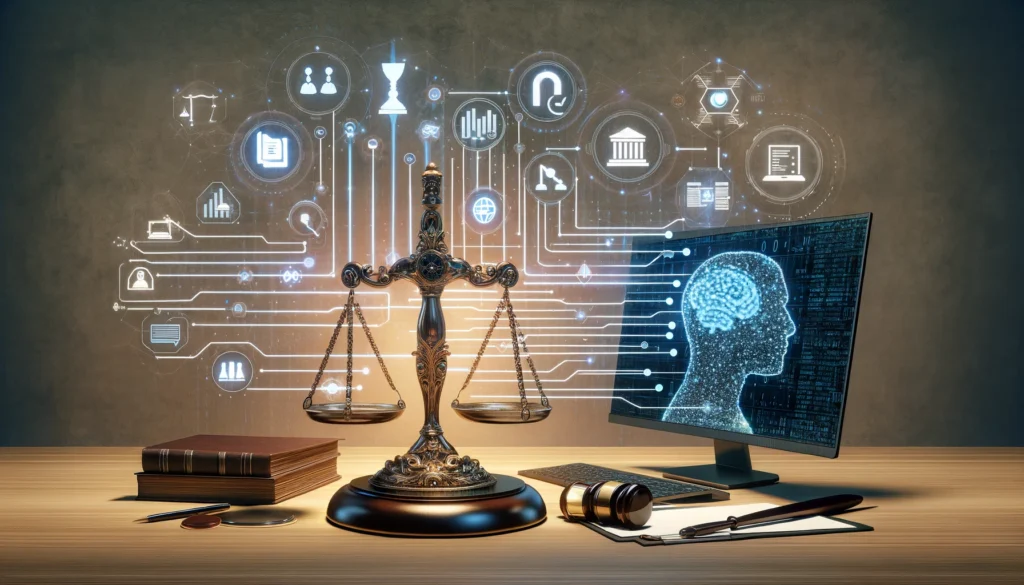
Unlocking Efficiency: Harnessing AI in Corporate Legal Tasks
Efficiency in the legal sector, especially for paralegals, is paramount. With mounting workloads and tight deadlines, increasing productivity without compromising quality is essential. Enter ChatGPT and other Large Language Models (LLMs). These AI tools are transforming routine tasks into streamlined processes. To grasp their impact, one should first understand the basics of Corporate Powers of Attorney (POA).
Corporate POAs are legal documents authorizing a designated entity or individual to act on behalf of a corporation. They are critical in ensuring that business transactions are executed smoothly. Paralegals often grapple with their drafting and review, a task ripe for AI enhancement.
The AI Paralegal Partner: ChatGPT’s Role
ChatGPT stands out in assisting paralegals by drafting and reviewing documents, including Corporate POAs. By generating initial drafts and providing review suggestions, the AI helps in reducing tedious manual effort.
Such integration saves considerable time, allowing paralegals to focus on complex aspects of legal work. Additionally, AI ensures enhanced accuracy and consistency by minimizing human error, making documents more reliable.
The fusion of AI into legal workflows heralds a new era, where augmented efficiency becomes the norm rather than the exception. Moreover, this seamless incorporation promises not only time savings but also improved precision and uniformity in legal documents.
Mastering the Basics: Getting Started with ChatGPT
Initial setup with ChatGPT is straightforward, but familiarization is key to leveraging its full potential. Start by registering for an account and navigating its user-friendly interface.
Key functionalities such as prompt creation, drafting, and reviewing are essential. Here are some basic prompts to get you started:
- “Draft a Corporate Power of Attorney for [Company Name] allowing [Attorney’s Name] to [specific action].”
- “Review the following Corporate Power of Attorney and highlight any inconsistencies.”
Understanding these functionalities provides a strong foundation, enabling paralegals to quickly execute routine tasks with AI support. The initial learning curve is short, but the efficiency gains are substantial.
The next step involves crafting more precise and nuanced prompts for complex scenarios.
Advanced Prompt Techniques: Crafting Precision Queries
Effectively structuring prompts is crucial for maximizing the benefits of ChatGPT. Here’s how:
- Be Specific: Include all necessary details to ensure precise outputs. For example, “Draft a Corporate POA allowing [Person] to sign contracts on behalf of [Company] in [Country].”
- Use Clear Instructions: Articulate what you need clearly. E.g., “Compare this POA with standard practices and note any deviations.”
- Create Context: Provide background information if the query involves complex scenarios. E.g., “Given the following scenario, draft a POA ensuring compliance with [specific jurisdiction’s] law.”
Creative prompt formulation enhances the AI’s capability. Injecting nuances, such as jurisdiction-specific details or bespoke conditions, ensures results are highly tailored. Here are some techniques:
- Incorporate specific legal terms to maintain document rigor.
- Use comparative analysis prompts for cross-referencing documents.
Next, we’ll explore practical uses in POA tasks where these advanced techniques come into play.
Strategic Applications: Practical Uses in POA Tasks
Drafting a Corporate POA with AI assistance becomes a breeze with structured prompts. You can:
- Generate Drafts: Create POAs by detailing specific acts authorized, involving the right parties.
- Review and Edit: Use the AI to scan documents for consistency, legality, and completeness rapidly.
However, common pitfalls such as over-reliance on AI without human review can be detrimental. Always cross-check for legal compliance and specific needs.
By intelligently applying these strategies, paralegals can significantly streamline their workload while maintaining the necessary rigor.
AI Tools and Compatibility: Beyond ChatGPT
ChatGPT isn’t the only tool in the AI toolkit. Integration with complementary AI tools can enhance functionality.
- Other LLM Tools: Tools like GPT-4 or legal-specific AI platforms provide added capabilities.
- Software Compatibility: Ensure seamless operation with your existing legal software for optimal productivity.
Ethical and Practical Considerations
While AI promises efficiency, confidentiality and data security are critical. Always ensure compliance with data protection laws and maintain human oversight to mitigate errors.
Ensuring ethical AI use is paramount for its sustained integration into legal practices.
Concluding Insights: The Future of Paralegal Work with AI
The integration of AI in paralegal tasks offers notable benefits, from enhanced efficiency to improved document accuracy. However, challenges such as ethical use and ensuring human oversight remain essential.
Embracing AI as a complementary tool, rather than a replacement, promises a future where paralegals can achieve unprecedented productivity while maintaining high legal standards.


